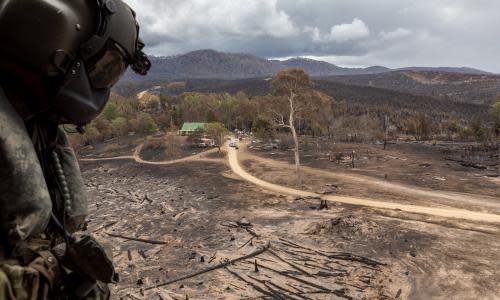There’s nothing safe about a country in flames, and the Coalition will exploit that

As bushfires raged across Australia’s south-east, Scott Morrison responded to questions about the climate crisis by stressing the nation-state’s weakness, not its power.
Australia produces just 1.3% of global emissions, he said, and it wasn’t credible to suggest that “doing something more or less” would change a worldwide phenomenon.
Yes, he did insist his government was acting. We were, he said, “doing our bit” and “carrying our weight”.
Those are lines with which you might dismiss an overzealous charity panhandler: “I’ve already given, thank you!”
They’re a response to a tiresome obligation. They’re not a promise of solutions.
Morrison has not said that temperatures will stabilise and the climate emergency will be averted.
How could he?
The only international mechanism currently in place stems from the Paris accords, the agreement by which the nations of the world pledged to keep global temperature rises below 2C.
A growing perception of state impotence will almost certainly be accompanied by ever more aggressive demonstrations of state power
But Paris is palpably failing. None of the major powers will meet their targets – and no other plan exists.
In democratic theory, the modern state legitimates itself through a simple bargain. We pay its taxes and obey its law; in return, it protects us and keeps us safe.
The increasing inability of states to keep that pact in respect of climate will only become more obvious, exacerbating an already widespread cynicism about the political class.
Paradoxically, a growing perception of state impotence will almost certainly be accompanied by ever more aggressive demonstrations of state power.
In Australia, Morrison’s supporters talk about fuel loads and arson.
In part, the pivot away from climate represents a simple bait and switch. After the world recorded its second-hottest year ever, conversations about hazard reduction help drown out conversations about climate.
But the new focus also shifts the debate in a direction the government likes.
If environmental bureaucracy had prevented hazard reduction (it didn’t), the answer lies in slashing green tape, an easy extension of an already existing ideological commitment to deregulation.
More importantly, the identification of (a largely bogus) arson outbreak transforms an ecological crisis into a law and order problem, paving the way for new legislation and fresh penalties.
And that’s something the state can deliver.
Think of Morrison’s almost instant response to the needles-in-the-strawberry affair. Decrying fruit saboteurs as “cowards” and “grubs”, the prime minister introduced harsh new laws that would send them to jail for as long as 15 years.
More police powers and increased sentences play to the strengths of what Nietzsche called “the cold monster”, allowing the leaders who announce them to sound stern and authoritative.
Accordingly, in Australia in 2019, politicians spent more time discussing how best to punish environmental protesters than they did devising legislation that might protect the climate.
Peter Dutton, for instance, called for activists to be “shamed”, jailed and cut off welfare.
“These people are anarchists and fringe-dwellers and they should face the full force of the law,” he said.
No government minister used similar rhetoric about carbon polluters.
Similarly, in Queensland, the Labor premier Annastacia Palaszczuk almost certainly can’t deliver the jobs that rural supporters of Adani think the Carmichael coalmine will bring them (the employment promises keep shifting) and nor can she save the Great Barrier Reef (since that would entail stopping climate change).
She can, however, rush through Joh-era style laws to jail Extinction Rebellion members.
The state, by definition, possesses a monopoly on coercion. As a result, politicians incapable of any real policy agenda know they still unleash force.
As Morrison himself says, the core responsibility of a prime minister is to “keep Australians safe”.
If the 2019-2020 fire season really does foreshadow the new normal on a warming planet, governments face a looming crisis of legitimacy, precisely because there’s nothing safe about a country in flames.
Related: Beware terrorists but don't sweat the climate crisis – how blind can Morrison be? | Jeff Sparrow
We’re likely, then, to see politicians asserting authority in an all too traditional way, with an increasing resort to the rhetoric of national security.
As I have argued previously, it’s not difficult to imagine what Morrison’s slogans of “resilience and adaption” might mean in the context of, say, climate refugees.
For decades, we’ve seen asylum seekers used as targets whenever a weak leader wants to look tough.
Global heating will make future governments seem extraordinarily weak – even as a huge new wave of refugees arrives.
In the midst of a genuine emergency, with the army already on the streets, the likely conjunction of climate and border politics does not bear thinking about.
• Jeff Sparrow is a Guardian Australia columnist

